|
|
|
Sort Order |
|
|
|
Items / Page
|
|
|
|
|
|
|
| Srl | Item |
| 1 |
ID:
091063
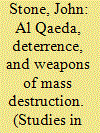

|
|
|
|
|
| Publication |
2009.
|
| Summary/Abstract |
This article takes issue with the frequently-made assertion that Al Qaeda cannot be deterred from employing weapons of mass destruction. It argues that Al Qaeda's leadership employs terroristic violence in a manner calculated to achieve a set of political goals. They are, in other words, rational actors who are sensitive to the potential costs and benefits associated with their actions, and thus are to some extent deterrable. The article examines a number of ways in which the lack of discrimination and proportionality associated with weapons of mass destruction might be expected to produce more problems than benefits for Al Qaeda and thus deter their use. It also considers some ways in which the West might seek to bolster these deterrent effects.
|
|
|
|
|
|
|
|
|
|
|
|
|
|
|
|
| 2 |
ID:
156949
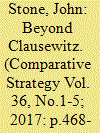

|
|
|
|
|
| Summary/Abstract |
Clausewitz has much to tell us about strategy. However, his most fundamental and enduring insights are obscured by his problematic theorizing about war in general. Essentially the same insights have been more clearly and economically articulated in the fields of political philosophy and game theory. As such, these literatures provide a more accessible introduction to the basics of strategy. The real value of Clausewitz resides in his profound understanding of how basic strategic dynamics play out in the specific context of war.
|
|
|
|
|
|
|
|
|
|
|
|
|
|
|
|
| 3 |
ID:
078718
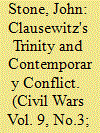

|
|
|
|
|
| Publication |
2007.
|
| Summary/Abstract |
Much as Martin van Creveld predicted in 1991, contemporary conflicts have tended to occur within, rather than between, states. Conversely, van Creveld's contention that such conflicts would not be amenable to Clausewitzian analysis has been the subject of much debate. More specifically, Clausewitz's famous 'Trinity' has been shown to be capable of accommodating non-state strategic actors as readily as the state-based variety. Quite what this means for the strategic analysis of contemporary conflict was not clearly spelt out in the debate on the Trinity, however. In this article, therefore, an attempt is made to present a specific approach to employing the Trinity as an aid to strategic analysis, with particular reference to the ethnic conflicts in the Balkans and the current war in Iraq
|
|
|
|
|
|
|
|
|
|
|
|
|
|
|
|
| 4 |
ID:
112452
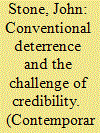

|
|
|
|
|
| Publication |
2012.
|
| Summary/Abstract |
The concept of 'credibility' is a central component of deterrence theory. In this article, credibility is used as a lens through which to examine the effectiveness of conventional force as a deterrent. An advantage that conventional force enjoys over its nuclear counterpart is that it can be used with much greater discrimination. Conventional threats can, therefore, be considered more politically credible than nuclear threats under all but the most extreme circumstances. Conversely, the relatively modest power of conventional weapons renders their effects 'interpretable' to a problematic degree by potential aggressors. Thus, such threats are less likely to be as technically credible as their nuclear equivalents. A range of communicative efforts may serve to reduce the scope for interpreting the effects possible to conventional weapons, although efforts of this kind risk being hampered by cultural obstacles. In consequence, success with conventional deterrence will turn on the ability to identify the specific technical and cultural conditions under which credible threats can readily be made.
|
|
|
|
|
|
|
|
|
|
|
|
|
|
|
|
| 5 |
ID:
115009
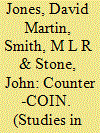

|
|
|
|
|
| Publication |
2012.
|
| Summary/Abstract |
The notion of "counterinsurgency" (COIN) has for some years been the central concept driving military operations in Afghanistan, and before that, in Iraq. It constitutes the dominant idea influencing much current military planning of the major Western powers. This study questions the assumptions and relevance of the thinking behind counterinsurgency doctrine. It suggests that the ultimate effect of its dominance is to reduce the highly contingent nature of war to a list of techniques, the application of which are regarded as a sufficient precondition whenever states deem that they are confronted by conflicts that can be described as an "insurgency." Such assumptions are both arbitrary and risk crowding out necessary, although by their nature very difficult, political judgments that are required for the effective construction and implementation of strategies that seek to ensure that the ends sought are proportional to the means employed.
|
|
|
|
|
|
|
|
|
|
|
|
|
|
|
|
| 6 |
ID:
120287
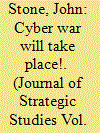

|
|
|
|
|
| Publication |
2013.
|
| Summary/Abstract |
The question of whether or not cyber war amounts to war per se is difficult to determine given strategic theory's uncertain grasp of the concepts of force, violence and lethality. These three concepts, along with their relationships with one another, are explored in order to demonstrate that cyber attacks can in fact be construed as acts of war.
|
|
|
|
|
|
|
|
|
|
|
|
|
|
|
|
| 7 |
ID:
099095
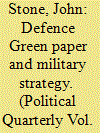

|
|
|
| 8 |
ID:
132280


|
|
|
|
|
| Publication |
2014.
|
| Summary/Abstract |
The use of conventional armed forces in a deterrent role merits close consideration. Instability in weak or failing states can have global ramifications, while efforts to build stability take time. In principle, conventional deterrence can be used to buy the time required for such stabilization efforts. Attempts at deterrence will, however, need to overcome credibility problems stemming from the technical limitations associated with conventional armed forces, and with the likely requirement for multiple external actors to deter multiple intrastate audiences. While deterrence might work under certain circumstances, it will not play as central a role in strategy as it did during the Cold War.
|
|
|
|
|
|
|
|
|
|
|
|
|
|
|
|
| 9 |
ID:
115216
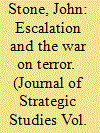

|
|
|
|
|
| Publication |
2012.
|
| Summary/Abstract |
This article makes a case for treating escalation in irregular warfare as different in kind from the regular variant that was originally theorized during the Cold War. The regular variant emphasizes the role of clearly defined and commonly recognized `thresholds' as a means of organizing cooperation within conflict. In contrast, the irregular variant can reward efforts by weaker terroristic actors to erode the moral significance of the combatant/non-combatant threshold, just as it can reward efforts by their stronger adversaries to bolster it.
|
|
|
|
|
|
|
|
|
|
|
|
|
|
|
|
| 10 |
ID:
112450
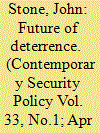

|
|
|
|
|
| Publication |
2012.
|
| Summary/Abstract |
How valuable might deterrence be for managing current and near-future threats to international peace and security? How might it work in such contexts? In 2010 a symposium was held at King's College London in order to address these questions. The participants examined a wide range of issues. A prominent concern was the extent to which the Cold War theory and practice of deterrence remains a valuable stock of relevant experience today. Specific attention was also given to the utility of conventional force as a deterrent, to the prospects for cyber deterrence, and to the feasibility of deterring non-state actors such as terrorist organizations. The participants all considered that deterrence has some role to play in Western strategy and sought to clarify what this might amount to under the specific conditions they examined.
|
|
|
|
|
|
|
|
|
|
|
|
|
|
|
|
| 11 |
ID:
151637
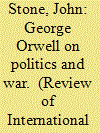

|
|
|
|
|
| Summary/Abstract |
George Orwell is not generally remembered for his views on strategy. Nevertheless a careful reading of his written work reveals a coherent appreciation of war’s strategic dimension. For Orwell, war is a necessary adjunct to politics, and the utility of strategic action should be based on rational considerations of cost and benefit. He rejected pacifism and self-imposed restraints on warfare on the basis that such positions proceeded from unexamined emotional commitments, and were neither instrumentally nor morally sound. He also maintained that the enemy’s political values are an essential input into effective strategic calculations. On this latter basis he criticised the strategic prescriptions of H. G. Wells and B. H. Liddell Hart for limited war with Nazi Germany.
|
|
|
|
|
|
|
|
|
|
|
|
|
|
|
|
| 12 |
ID:
054689
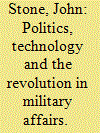

|
|
|
| 13 |
ID:
149019
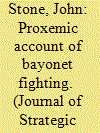

|
|
|
|
|
| Summary/Abstract |
The bayonet has long been regarded as an obsolete piece of military technology. This article advances a proxemic account of close combat, which points to its continuing utility under modern battlefield conditions. It is argued that bayonet training remains an effective way of preparing soldiers to psychologically dominate contested spaces on the battlefield. Thus, although other weapons and techniques can fulfil the same role, it can nevertheless be argued that the bayonet’s enduring presence is not simply the result of some atavistic military mind-set.
|
|
|
|
|
|
|
|
|
|
|
|
|
|
|
|
| 14 |
ID:
181201
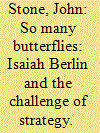

|
|
|
|
|
| Summary/Abstract |
Isaiah Berlin has not attracted much attention from academic strategists. This is unfortunate, because his concept of value pluralism helps explain why strategic decisions are burdened by uncertainty. It also highlights the importance of political judgement in reducing this uncertainty and the role of history in educating political judgement.
|
|
|
|
|
|
|
|
|
|
|
|
|
|
|
|
| 15 |
ID:
177563
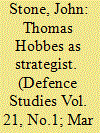

|
|
|
|
|
| Summary/Abstract |
Hobbes’ relevance to the concerns of strategy has gone unappreciated. He is, after all, interested in escaping the condition of war, rather than exploiting its political utility. And yet, exactly because of this, Leviathan addresses the principal difficulty with strategic deliberation – which is the epistemic deficit that attends human interaction, encouraging anticipatory violence. As the military theorist Carl von Clausewitz observed, minimizing the costs of war involves identifying opportunities for exercising mutual restraint over its conduct. And achieving this requires that the aforementioned epistemic deficit be ameliorated. For Hobbes, the sovereign state achieves this for its citizens; but he also considers other solutions in the context of relations between such states. The resulting insights are relevant to matters such as nuclear deterrence, and recent stability operations in the Middle East.
|
|
|
|
|
|
|
|
|
|
|
|
|
|
|
|
|
|
|
|
|